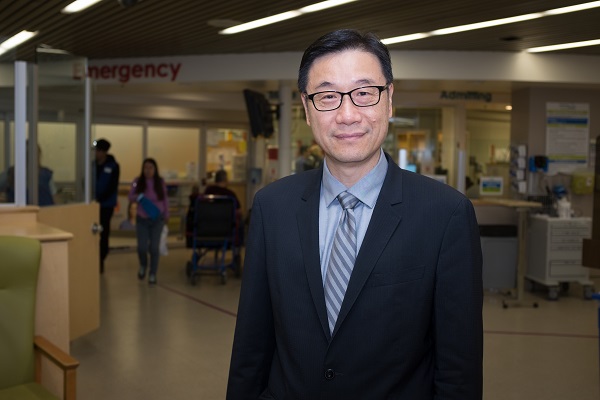Researchers found that the video-based service helped callers receive more accurate and timely care recommendations.
By Vivian Sum, Vancouver Coastal Health Research Institute
With the onset of the COVID-19 pandemic, the global community—including health care providers—had to shift gears from providing in-person services to offering more remote options. Vancouver Coastal Health Research Institute clinician-scientist Dr. Kendall Ho was one of those leading the charge, spearheading the launch of the HealthLink BC Emergency iDoctor-in-assistance (HEiDi) service shortly after the start of the pandemic.
Now, new research from Ho shows that the virtual physician service successfully redirected 72.1 per cent of callers away from in-person emergency or clinic assessments and 15 per cent to emergency departments for urgent care.
HEiDi builds on HealthLink BC’s 8-1-1 phone line, which connects British Columbians with registered nurses. Nurses use an online clinical assessment algorithm and their professional judgment to triage callers into four colour-coded categories of escalating concern:
- Green—home care treatment recommended
- Black—schedule an appointment with a care provider as soon as possible
- Yellow—see a care provider in person within 24 hours
- Red—go to an emergency care facility immediately
The HEiDi service started in April 2020 to connect callers in the ‘yellow’ category with a team of virtual physicians—it began connecting with ‘red’ category callers in November 2020. Confidential appointments take place through a phone or video conferencing platform, the latter of which provides physicians with a visual aid to assist with their assessment and patient care recommendations.
“Many callers who call 8-1-1 do not need to see a doctor urgently, which is why we focused on the patient population nurses identified as needing to visit a care provider within a day,” says Ho.
Translating research into better care for British Columbians
8-1-1 experienced a seven-fold surge in call volumes around the start of the COVID-19 pandemic, largely due to uncertainties surrounding the virus and how to safely access health care services, says Ho.
HEiDi was implemented to help manage this surge by providing an added layer of advice to 8-1-1 calls.
Ho’s research study investigated HEiDi from its start on April 6, 2020, until August 2 that same year. During this time, 8-1-1 nurses triaged 21,441 callers into the ‘yellow’ category and referred 7,845 (34 per cent) to HEiDi. Of these, HEiDi virtual physicians redirected almost three out of four callers away from in-person emergency departments or clinics, Ho’s study found.
This potentially spared callers and the health care system from non-urgent visits to care centres during a time of greater uncertainty about how the COVID-19 virus was transmitted, and whether its spread would overwhelm hospitals with symptomatic and infected callers, says Ho.
“We wanted to develop a service that could give callers the right recommendations at the right time.”
Virtual physicians, including Ho, were also able to escalate 15 per cent of callers to ‘red’, recommending that callers immediately go to an emergency department or other urgent care facility.
“One couple in their 30s who I spoke with through the HEiDi service was concerned about the wife experiencing shortness of breath after being diagnosed with COVID-19,” recalls Ho. “They were hesitant to go to the hospital because of fears of what could happen next.”
“It was a privilege to help ease their anxiety and provide them with immediate health advice about the safety of hospitals and the importance of seeking immediate care.”
Ho’s next study into the HEiDi service will connect physician recommendations with care facility data and patient outcomes to develop a clearer picture of HEiDi’s broader impact.
“As a physician and researcher, it has been very rewarding to bring research into practice,” says Ho. “It is a reciprocal relationship in that the HEiDi service informs the study, and the study also informs the service to support excellence in health care.”
Vivian Sum works in communications at Vancouver Coastal Health Research Institute.


